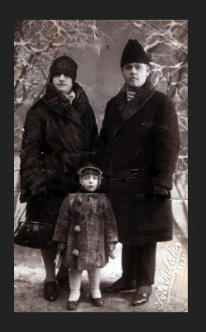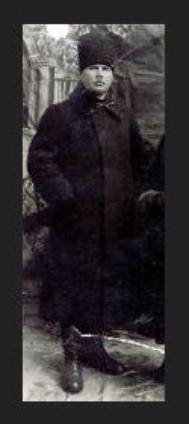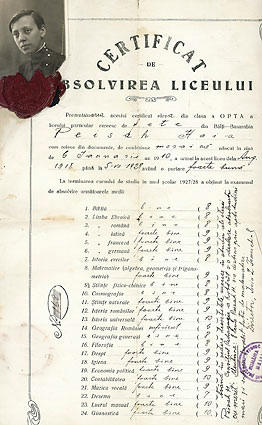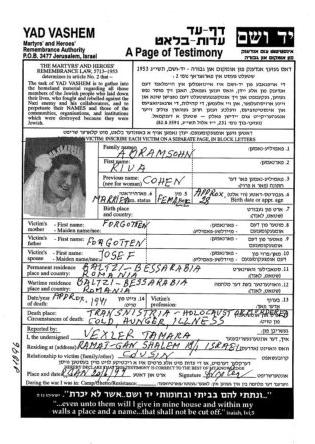

Copyright © 2017 Martin Davis



courtesy of www.centropa.org

My father David Kotliar near our house in Bălți in 1929. His
sister Sarah kept this picture otherwise it would have been
destroyed along with other documents during World War II.
My father was born in 1901. He strictly observed all Jewish
traditions even during the Soviet times. I believe he was born to
a religious family. He and his brothers studied at cheder. They
spoke Yiddish at home, but they also knew Russian and
Moldavian. My father and his older brother Motl became tailors.
My mother, Eta Kotliar, moved to Bălți in 1924 because it was a
bigger town and easier to find a job there. She got a job at a
seamstress' shop and rented a room that she shared with other
girls. My father was a skilled tailor by that time. His shop was
near the place where my mother worked. My father noticed and
began to court her. They went to Orgeyev, my grandparents
liked my father and they gave their consent to the wedding.
They got married in 1927. They had a traditional Jewish
wedding with a chuppah and klezmer musicians in Beltsy.
My father earned well, and they could afford to have a big
wedding party and invite all relatives to celebrate. After they got
married he bought a big house in the main street in Bălți. He
quit his job and opened his own tailor's shop. He had a shop in
the biggest and lightest room in his house. There was an
orchard and a flower garden near the house.
My parents were religious. They observed all Jewish traditions
and followed kashrut. We spoke Yiddish at home. My father
worked from morning to night. He wanted to provide well for his
family and have a decent Sabbath and other Jewish holidays.


From right to left: my older sister Riva Shneider [nee Kotliar], my older
brother Haim and his friend, our neighbour Pete, a Ukrainian, near our
home in Bălți in 1937. This is a prewar photograph that Peter's mother
gave to me when we arrived in Bălți after the war. All our belongings and
documents were destroyed on the first day of the war when a bomb hit our
house.
My parents got married in 1927. They had a traditional Jewish wedding
with a chuppah and klezmer musicians in Bălți. My father earned well, and
they could afford to have a big wedding party and invite all relatives to
celebrate. After they got married he bought a big house in the main street
in Bălți. He quit his job and opened his own tailor's shop. He had a shop in
the biggest and lightest room in his house. There was an orchard and a
flower garden near the house.
My sister, Riva, was born in 1929, and my brother, Haim, followed in 1932.
He was named after my grandfather on my father's side. I was born in
1934. In 1936 my mother's father Shoil died. My parents named their next
son Shoil, born in 1938, after our deceased grandfather. All boys were
circumcised according to Jewish tradition.
My parents were religious. They observed all Jewish traditions and
followed the kashrut. We spoke Yiddish at home. My father worked from
morning to night. He wanted to provide well for his family and have a
decent Sabbath and other Jewish holidays.
My father was rather strict with us, but my mother never raised her voice
or treated us angrily, and we tried not to upset her. My older brother went
to cheder when he turned 6 and began to work at the age of 9. He
became a shoemaker apprentice. My sister had a teacher teaching her at
home. Riva studied Yiddish and Hebrew. In 1940 Moldavia became a part
of the USSR and neither my brother nor I studied at cheder. The Soviet
authorities persecuted religion and all religious institutions were closed.
Michael Kotliar
Shoah Survivor
Michael Kotliar's sister Riva Kotliar Shneider,
brother Haim Kotliar and their neighbor Peter in
Beltsy (circa 1937)
David Kotliar taken in Beltsy (1929)

My mother was born in 1910 in Bălți in Bessarabia, which until 1918 belonged to Russia, and in 1918-1940, to Romania. I know about mother's
childhood thanks to her certificate from the grammar school. The certificate was given to mother as a pupil of a private Jewish grammar school in Bălți.
She entered the grammar school in August 1918 and completed her studies in July 1928.
Right after graduation from the grammar school in 1928 mother went to Belgium and entered the University of Liege. She studied chemistry there. We
have a certificate of the Ministry of Science of Belgium, stating that mother passed entrance examinations to the university. In spite of the fact that
mother was from a well-to-do family and her parents could pay for her studies, my mother earned additional means as a governess, an occupation that
was quite common among students. That was the time when she acquired her skills in cooking, sewing and housekeeping for her future life. Mother
could do almost any work, and wasn't afraid of any challenges in her life. She studied well, but the emigrants had no right to participate in revolutionary
activity. She studied in Belgium for two years, from 1928 to 1930, and then was expelled for participation in students' disturbances. In France the
regulations were similar at that time, but she still decided to go to France. Mother entered the Chemistry Faculty of the University of Lyon and finished it
in 1934. We have her diploma as well.

Kotliar
Peisakh
This is the certificate given to my mother Haya
Peisakh after graduation from grammar school
in the town of Beltsy in 1928. It certifies that my
mother completed her Hebrew studies.
This is a photo of my mother Haya Peisakh and her
friends taken in Beltsy in the 1920s. On the reverse
side of this snapshot there is an inscription in an
unsteady teenager's hand: ‘Taken in summer, before I
entered the 7th grade in school.' Mother is third from
the right, her friend Ida is second from right.
Tkach
This is my husband, Yefim Tkach, at the age of two with his parents Mark and Nehama Tkach. This photo was taken in Bălți in 1928. Yefim was born into a middle class Jewish family in Bălți in 1926. His father, Mark Tkach, was a fur specialist, and his mother, Nehama, helped him. Yefim studied in a grammar school. His younger brother Yevgeniy graduated from elementary school. When the war began, they left Bălți on foot. The German troops caught up with them in Kryzhopol in Vinnitsa region and they were taken to the ghetto in Kryzhopol. They survived since they knew Romanian and there were Romanian guards in the ghetto. Yefim's mother was a cook for a Romanian officer and his father also worked for somebody. When in 1944 Soviet troops approached Kryzhopol, the Romanians escaped. The family survived the Shoah Yefim finished school and studied at the Pedagogical College in Bălți. He didn't like it and went to Kishinev where he entered the flute class at the Conservatory. Later becoming a teacher in Kishinev.Yad Vashem ‘Pages of Testimony’ and
Centropa.org survivors stories
There are three valuable sources of information about the life of families of Bălți prior to 1941. The first of these are the narratives that can be provided by those whose families left the town prior to the Shoah and the second and third of these are provided through the testimonies by Shoah survivors as ‘Pages of Testimonies’ to the Yad Vashem and the testimonies collected by Centropa.org of survivors who now live within the area covered by the former Soviet Union.
Family Narratives
The immigrant Jewish community of Bălți - that is those that left the town prior to the Shoah - have been appealed to for images and stories about their family’s lives but, as yet, these have not been forthcoming.Yad Vashem Pages of Testimony
There are approximately 900 of these testimonies related to those who died in the Shoah and who were either resident in the town or murdered there. The Pages of Testimony for Bălții from The Central Database of Shoah Victim’s Names stands as an important historical record of the children and adults whose lives were brutally cut short as the Nazi’s and their followers tore the heart out of the community.Centropa.org
Is the “..first oral history project that combines old family pictures with the stories that go with them, Centropa has interviewed almost 1,300 elderly Jews living in Central and Eastern Europe, the former Soviet Union, and the Sephardic communities of Greece, Turkey and the Balkans.” Excerpts from the Centropa.org site related to the former residents of Balti are given below courtesy of Edward Serotta (Director).
Page of Testimony for Riva Abramsohn















